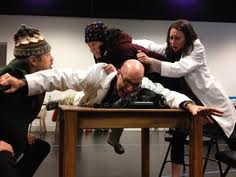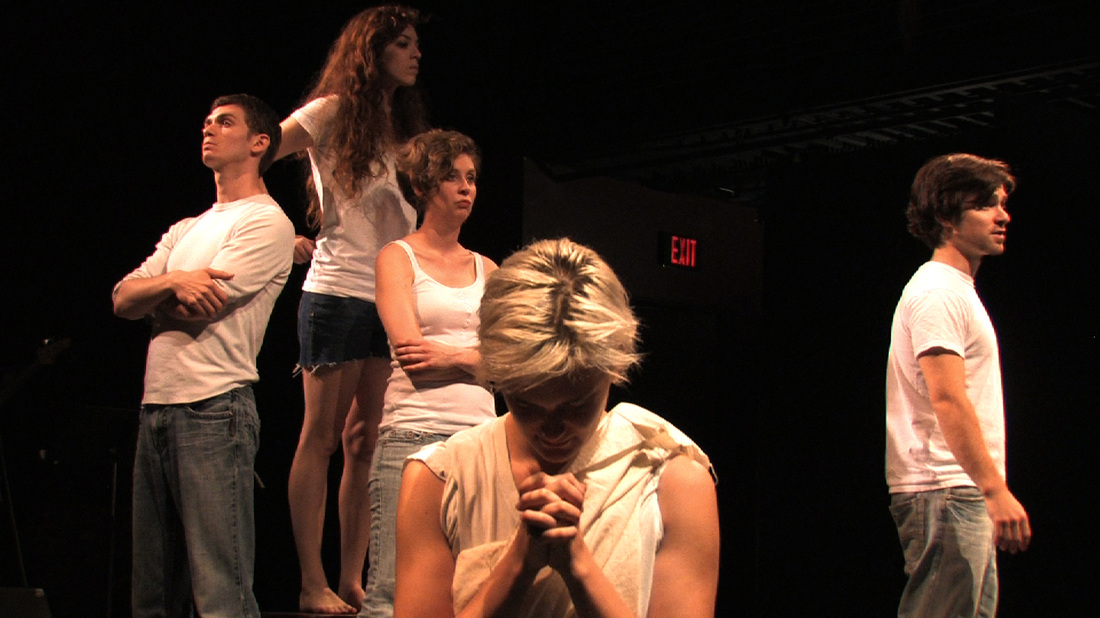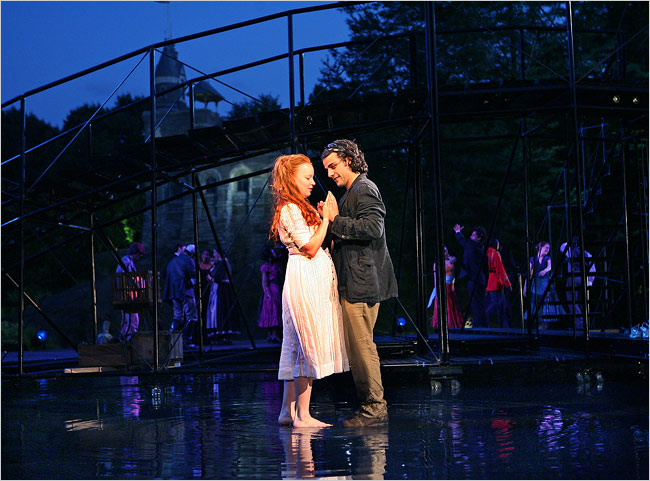|
JACQUELINE LAWTON: Why did you decide to get into theatre? Was there someone or a particular show that inspired you?
LAURA ESTI MILLER: I've always equally loved books and art of all sorts - music, dance, visual art, puppetry. As soon as I could read, I devoured anything and everything in print. My sister and I devised elaborate roller-skating musicals in our basement long before we knew about Starlight Express or Xanadu. Endlessly listening to an early cast album of Les Miserables (on scratched vinyl) and questioning my mom about her experience of watching it in the theatre exploded my six-year-old imagination. I think that was when I started trying to figure out how to physically recreate all of the stories I knew at that point, and I kept on gathering more art, more stories, and more songs so that I could figure out characters' personal histories, making them leap out of books, off of walls, and through the record player. JL: How do you define dramaturgy? Or explain to people the work that you do? LM: When meeting new people, "dramaturgy" is often one of the first four syllable words to come up in conversation. Many dramaturgs I know cultivate a quick cocktail party answer in addition to a longer explanation of what it is that dramaturgs do. My cocktail party answer changes according to what aspect of the work I'm focused on at the time and what projects are on the horizon. Sometimes I say that I work with playwrights to develop new work, other times I talk more about research and education. My longer explanation often involves calling what I do "theatre anthropology." Dramaturgs are theatrical anthropologists. We uncover the roots and origins of the piece, discover how it behaves, what variations and differences make it unique, and analyze how structure impacts its outcome. It can be a challenge to narrow what a dramaturg does into a soundbite because the job changes due to the particular demands of the play, project, theatre, or organization. JL: How long have you lived and worked as a dramaturg in DC? What brought you here? Why have you stayed? LM: I grew up in the DC area. I returned after college to work in educational theatre and had my first taste of professional dramaturgy. I dramaturged plays and projects in college, but I didn't realize that that's what I was doing. After a few years of guessing and taking wild swings at dramaturgy (many thanks go to Forum Theatre's Michael Dove and Paul Frydrychowski for allowing me so much room to fail and grow in those years!), I knew I wanted and needed formal training. I applied to grad school, moved to New York for a few years to study, train, and gain as much experience as I could. After school, a few internships, and some extraordinary jobs, I moved back to the DC area in the fall of 2010 in order to be near both my ancestral and artistic homes. Since returning, I have been welcomed back to Forum, and have also been honored to be part of both The Inkwell and Pinky Swear Productions. JL: If your work as a dramaturg doesn’t pay the bills, what else do you do? How do you balance this work with your dramaturgy? LM: In addition to freelance dramaturgy, I teach. I am a professor and teaching artist. I do keep strange hours. No two weeks look exactly alike! JL: What skills and traits do you feel a successful dramaturg should have to support the development of a new play or a production? LM: I find that it is helpful to listen, to ask questions (hopefully the right questions!), and to make sure that you are working towards developing the piece that the playwright or group of artists wants to create, not just the one that YOU want to create. JL: What is the greatest part of being a dramaturg? What has been your most difficult challenge? LM: I have a few greatest parts:
A challenge of being a dramaturg is that it is not a consistently defined role. While that can be exciting, in that I can apply skills in so many different areas, it is also not always a given that a dramaturg could or should be involved in script or production development. The challenge becomes working with a team that just might not know how to best work with a dramaturg, or occasionally, might resent working with a dramaturg (this has not happened to me too often, just to clarify, but I get questions about it because of how the role has been dramatized on TV of late). JL: Who are your favorite playwrights? What is it about their work that inspires or draws you to them? LM: I have many! This is not a definitive list by any means, and I'm not sure if there is just one thing that unites these writers, but I find that I'm often drawn to playwrights who are confronting deep fears or pain, who do something a little surprising with darkness. Julia Cho, Mia Chung, Ross Harris, Henrik Ibsen, Callie Kimball, Tony Kushner, Martin McDonagh, Lynn Nottage, David Robinson, Melissa Ross, Stephen Spotswood, Joe Waechter, Anne Washburn, Lauren Yee. Also, I always find something new and fascinating in Shakespeare. JL: DC audiences are ... LM: Bright. Honest. JL: DC actors, designers and directors are .. LM: Incredibly talented and dedicated JL: DC playwrights are … LM: A mighty force! Unstoppable. JL: DC critics are ... LM: Willing to connect and support the artists in our city JL: How do you feel the DC theatre community has addressed the issues of race and gender parity? How has this particular issue impacted you and your ability to get your work produced on the main stages? LM: There is much to do in this area. That is such an understatement that it's laughable. We, as a theatre community, as an arts-interested society, must support and highlight more diverse talent. Personally, I am blessed to have a great deal of support from Pinky Swear Productions - whose mission is to showcase female talent whenever possible - and The Inkwell - also female-helmed and committed to featuring wonderful local talent (I must credit Lee Liebeskind with great feats of casting in every reading! He does a marvelous job) - and Forum, where we are making strides to demonstrate gender equity in our work, as well. I know we need to go further to address both gender and racial parity on our stages and in our artistic teams. Those conversations are happening, which is a start. JL: What advice do you have for an up and coming DC based dramaturg who has just moved to DC? LM: Go see productions. Offer to read plays for theatre companies. Reach out to dramaturgs and grab coffee/drinks with them. Become friends with playwrights, directors, designers. Continue to read everything. Get involved in things that are not solely theatre-related. Believe in yourself. JL: What's next for you? Where can we keep up with your work? LM: I'm going to be reading lots of new, exciting plays for multiple companies:
0 Comments
Your comment will be posted after it is approved.
Leave a Reply. |
My BlogI'm a playwright, dramaturg, and teaching artist. It is here where you'll find my queries and musings on life, theater and the world. My posts advocate for diversity, inclusion, and equity in the American Theatre and updates on my own work. Please enjoy!
Categories
All
Archives
June 2020
Reading List
|



